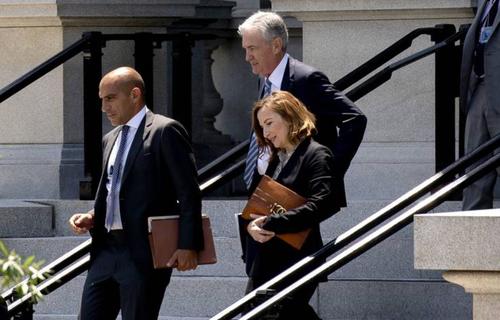CFTC Fines Bitfinex, Tether $43MM For “Misleading” Claims About Reserves
Years ago, several anonymous accounts on twitter, reddit and other social media platforms complained that tether, one of the original stablecoins, and Bitfinex, the crypto exchange that helped create tether, were conspiring to drain the reserves from Tether’s bank accounts, something that Bloomberg appeared to confirm in a report published earlier this month.
The SEC has been saying for months that regulating stablecoins is a priority, just like finally legalizing a bitcoin ETFs. But stablecoins present a unique threat to the US dollar, as one Treasury official explained earlier. Their lack of volatility (even tether continues to trade at roughly $1 despite reports about tether’s reserves) mean they could be used for payments, making them a competitor to the dollar (while bitcoin and altcoins are more accurately compared with precious metals).
The agency said Friday that tether and Bitfinex will pay a combined $42.5MM, with $41MM of that coming from tether, and the remaining $1.5MM coming from Bitfinex.
Tether’s fine was imposed over the company’s claims that its stablecoin was “fully backed” by US dollars (which, as Bloomberg demonstrated, it’s not). Bitfinex, meanwhile, will pay $1.5MM over findings that “Bitfinex engaged in illegal, off-exchange retail commodity transactions in digital assets with U.S persons on the Bitfinex trading platform and operated as a futures commission merchant (FCM) without registering as required,” according to the statement.
The CFTC took a few seconds to pat itself on the back in its press release as the feuding over which agencies have jurisdiction over crypto continues to intensify.
“This case highlights the expectation of honesty and transparency in the rapidly growing and developing digital assets marketplace,” said Acting Chairman Rostin Behnam. “The CFTC will continue to take decisive action to bring to light untrue or misleading statements that impact CFTC jurisdictional markets.””
The CFTC added that it imposed these charges in keeping with its Congressional mandate to protect American investors from scams and fraud.
“As demonstrated by today’s actions against Tether and Bitfinex, the CFTC is committed to carrying out its statutory charge to promote market integrity and protect U.S. customers,” said Acting Director of Enforcement Vincent McGonagle. “The CFTC will use its strong anti-fraud enforcement authority over commodities, including digital assets, when necessary. The CFTC will also act to ensure that certain margined, leveraged or financed digital asset trading offered to retail U.S. customers must occur on properly registered and regulated exchanges. Moreover, as the Bitfinex order reflects, the CFTC will take decisive action against those who choose to violate CFTC orders.”
The penalties stemmed from the same findings about tether’s lack of verifiable reserves that Bloomberg disclosed earlier this month. Since…”at least June 1, 2016 to February 25, 2019, Tether misrepresented to customers and the market that Tether maintained sufficient U.S. dollar reserves to back every USDT in circulation with the “equivalent amount of corresponding fiat currency” held by Tether and “safely deposited” in Tether’s bank accounts. In fact Tether reserves were not “fully-backed” the majority of the time.”
The CFTC also found that tether only held the amount of fiat reserves that it advertised during only 27.6% of the days in a 26-month sample time period from 2016 through 2018.
The investigation also showed how Bitfinex helped tether essentially launder its reserves. “…[I]nstead of holding all USDT token reserves in US dollars as represented, Tether relied upon unregulated entities and certain third-parties to hold funds comprising the reserves; comingled reserve funds with Bitfinex’s operational and customer funds…” Tether also neglected to complete mandatory audits during this time. The company even went so far as to put up tether’s reserves to cover Bitfinex losses when it was struggling with a hacker-induced “liquidity crisis.”
Tyler Durden
Fri, 10/15/2021 – 14:26
via ZeroHedge News https://ift.tt/3j8wJmi Tyler Durden
